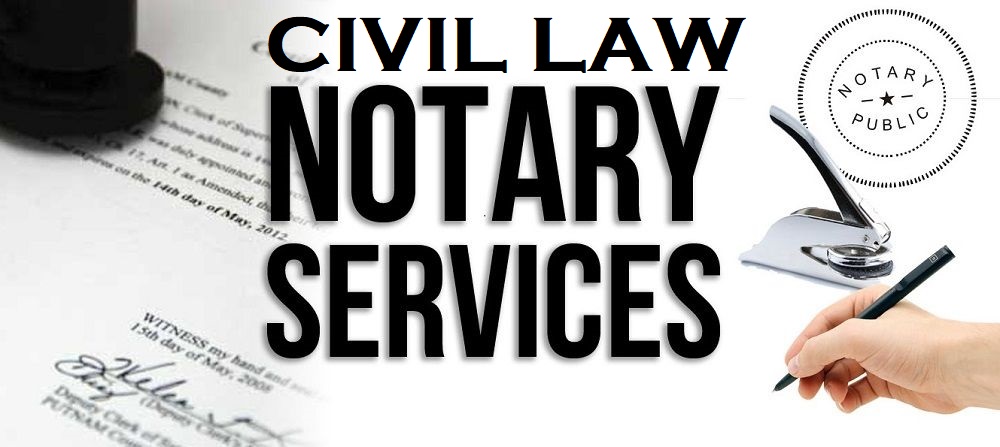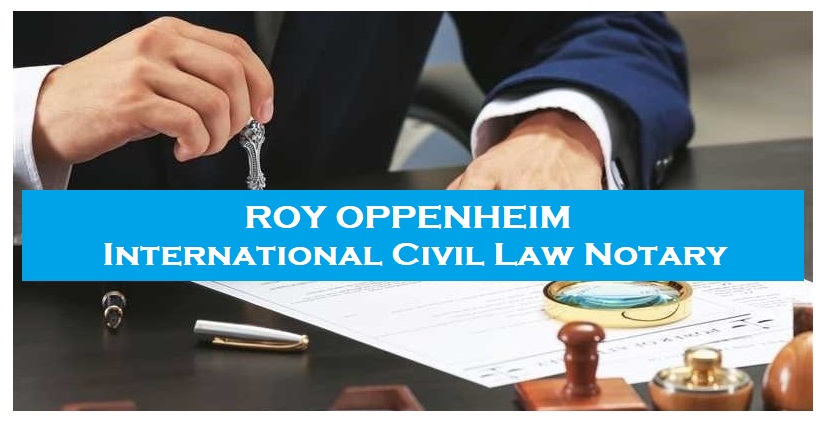Consult with a Civil Law Notary Before Heading to a Consulate, You May be Able to Avoid the Trip!
Wed Jan 23, 2019 by Oppenheim Law on Florida Real Estate & Real Estate Law

Civil Law Notary Roy Oppenheim’s Discussion about Florida’s Civil Law Notaries.
Since the recent appalling affair involving the Saudi consulate in Turkey, many have come to the realization that by personal choice they would prefer not to enter a consulate and rather have their business conducted outside in a private, less targeted, setting. However, there is a generalized misconception that consulates are the only place with the authority to properly officiate foreign countries’ documents, hence, that a visit to such office is required to fulfill legal requirements of proceedings in their native, many civil law, countries. That is not necessarily the case. Because of the advent of the international civil law notary, most people would be able to have their documents officiated in front of such official, who is qualified and certified to break through the legal barriers between civil law and common-law jurisdictions, simplifying legal proceedings involving parties located outside, but dealing with other parties or properties inside of civil law jurisdictions, such as the Latin American countries.
What Is An International Civil Law Notary?
There are very few civil law notaries in the United States. The only places you will likely find them is Louisiana, based on the French Napoleon Code approach of the State, Puerto Rico, based on the Spanish Code approach of the State, and Alabama and Florida, as those are the only two States that have codified the creation of the office of “International Civil Law Notary” in their common-law jurisdictions. In Florida, there are approximately 100 civil law notaries that have been appointed by the governor after these individuals had been practicing law for a minimum of 5 years and took what is, in fact, a rather rigorous 3-day course and a half day exam. The pass rate on these exams is not exceptionally high and covers far beyond Florida or American law but requires a survey of the roots of civil law, going back to the Greeks and Romans traveling up through modern day European law. Ironically enough, there are approximately 3,000 lawyers in the state of Florida who actually think they are civil law notaries when they are not.
Qualifications of a Civil Law Notary
Typically, a local notary in the United States who is not required to have more than a high school education, will not be qualified and authorized to execute and perform the necessary formal requirements that a civil law notary can provide. Civil law notaries have a breadth of authority that has been conveyed upon them by the state of Florida as well as through the various notarial conventions that have been executed by the various countries of the world, including the 1961 Hague Convention Abolition of the Requirement on the Legalization for Foreign Public Documents. Thus, a civil law notary is free to travel almost anywhere in the world (other than countries that the United States currently does not have diplomatic relations with) and execute documents either in that country or in any other part of the world where ordinarily one would go to the consulate or a local notary of that particular country.
The Role of Civil Law Notaries
The nature of the civil law notary, Notario (in Spanish), Notaire (in French) and Symvoulographs (in Greek) is very different from the nature of the “Public Notary” in common law jurisdictions. Under civil law the notary has three main functions: To draft legal documents such as wills, contracts and codicil; to authenticate legal instruments; and to serve as a public repository of legal documents and instruments. Hence, the international civil law notary can officiate so many types of transactions that emanate from those roles, that we will provide here a short list with some examples of the functions and services a civil law notary may facilitate:
Real Estate Deeds: Oversee and certify the execution of Deeds for Real Estate conveyed in a foreign jurisdiction.
Wills and Probate: Facilitate transfer of property located in a foreign civil law jurisdiction by Authentic Acts that certify: death, identity, authority and jurisdiction of U.S. probate courts.
Power of Attorney: Draft Authentic Acts that validly certify execution of Powers of Attorney for a civil law jurisdiction.
Identity and Survival of Pension Beneficiary: Draft Authentic Acts that confirm that the beneficiary of a pension provider or retirement fund located in a civil law jurisdiction is still living.
Proof of Records: Draft Authentic Acts that validate a wide variety of private records including: school transcripts, insurance certificates, employment history and financial statements.
Corporate Transaction: Facilitate participation of U.S. residents in corporate affairs of foreign companies by preparing corporate resolutions and transaction as Authentic Acts acceptable and valid in civil law Jurisdictions.
Domestication of Judgments: Civil law notaries may certify and validate the entry of a judgment in a U.S Court, the jurisdiction of the issuing-court, and the identity and authority of the clerk that certified the copy of the judgment, in order to have it recognized in the foreign country where the judgment’s debtor owns property or has assets that may be attached.
Marriage Ceremonies in International Waters and International Air Space: International waters are the jurisdiction of the web of international treaties that constitute international law, which is the body of law that vests power to international notaries. Hence, these official may perform valid Marriage Ceremonies in the High Seas.
Attest and Supervise Guinness World Records: Guinness World Records is a global brand with offices in London, New York, China, Japan and UAE. Therefore, the brand accepts civil law Notaries affidavits as a valid confirmation of the accuracy of the measurements and details of the applicant’s claims.
Clearly, the variety of services are very wide. Should you require to transact any business in or with a party located in a foreign country contact us first, you may be able to save the trip abroad or even to the consulate! To get more information and details on our special international civil law notary services, please feel free to contact us online or by phone at (954) 280-5739, and specifically speak with Roy Oppenheim.
From The Trenches,
Roy Oppenheim



Excellent explanation for those who are not aware of problems which will arise if they won’t consult a civil law notary before heading to a consulate!